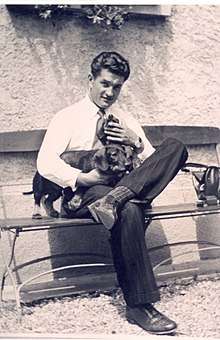Juozas Lukša
Juozas Lukša also known by the pseudonym Daumantas or Skirmantas (August 10, 1921 in Juodbūdis village, Prienai District Municipality – September 4, 1951 in Pabartupis village, Kaunas district) was one of the most prominent post-World War II leaders of the Lithuanian partisans, the anti-Soviet armed resistance. In 2003, director Jonas Vaitkus released a movie based on his life, Utterly Alone. In 2014, co-directors Jonas Ohman and Vincas Sruoginis released a documentary, The Invisible Front[1], of Lukša and his fellow Forest Brothers. fighters During the first occupation by the Soviet Union in 1940–41, Lukša was a member of the Lithuanian Activist Front. Opposing the Soviets, he was caught and imprisoned in Kaunas. After the war started in the Eastern Front and Nazi Germany invaded Lithuania, Lukša was released.

From 1944, after the return of the Red Army, he engaged in the underground movement. At first he participated as a student, helping out with clandestine matters and unarmed resistance in Kaunas. In 1946, after the arrests of many activists, he left the city and joined the armed resistance. Within a year he commanded Birutė brigade of Tauras district that was active in Kaunas area.
At the end of 1947, he along with fellow partisans Jurgis Krikščiūnas–Rimvydas and Kazimieras Pyplys–Mažytis crossed through the Iron Curtain as a messengers to the West in hopes to attract support for the fighters and to establish contacts with Lithuanians in exile. They carried information collected by partisans about Soviet repressions, killings and deportations, also a letter to Pope Pius XII explaining the situation in occupied Lithuania and asking for support for strugling nation. He first came to Sweden. Later he was engaged by the French intelligence and thereafter transferred to CIA, where he received training as an intelligence agent in West Germany. While in Paris he met Nijolė Bražėnaitė, fell in love and got married. During the stay in the western countries, he wrote a book Fighters for Freedom about the actual situation in the Soviet Union. He was parachuted back to Lithuania in 1950. For a year he was intensively searched for by the Soviet counterintelligence. Finally he was betrayed by fellow fighter Jonas Kukauskas and killed in fall 1951.
Further reading
- Juozas L. Daumantas (1975). Fighters For Freedom. Lithuanian Partisans Versus the U.S.S.R., New York: Manyland Books. ISBN 0-87141-049-4
- Juozas Lukša (2009). Forest Brothers: The Account of an Anti-Soviet Lithuanian Freedom Fighter, 1944–1948, translated by Laima Vincė, Budapest: Central European University Press. ISBN 978-963-9776-37-1
References
- "The Invisible Front (Nematomas frontas)". www.imdb.com. Retrieved 17 September 2019.
- (in Lithuanian) (2006-11-30) Minimos Daumanto gimimo ir mirties metinės, Bernardinai.lt. Accessed 2006-12-26.